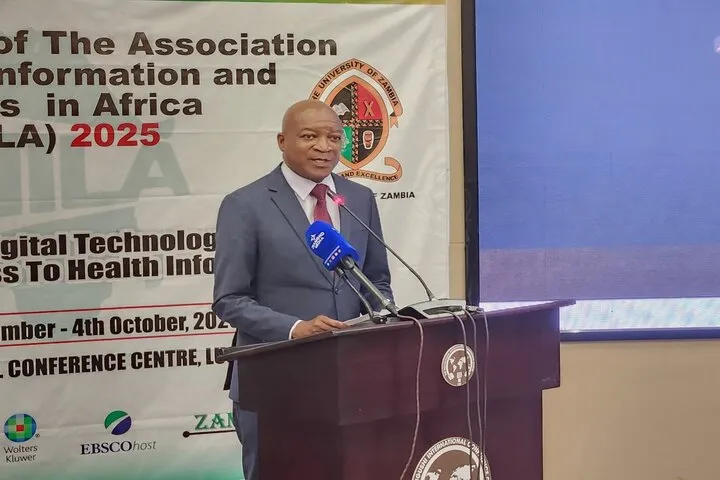
The Association for Health Information and Libraries in Africa (AHILA) recently held the 18th Congress from 30th September to 4th October 2025 in Lusaka, with a powerful call for harnessing innovative digital technologies to achieve universal access to health information across the continent.
The event, which was hosted at the Mulungushi International Conference Centre under the auspices of the University of Zambia marked the first time Zambia was hosting this pivotal gathering, attracting delegates from across Africa and beyond.
Speaking during the official opening, the Minister of Education Honourable Douglas Syakalima, M.P. emphasised the critical role of timely and reliable health information in achieving equitable health outcomes.
“The theme of this Congress, 'Innovative Digital Technologies for Universal Access to Health Information,' is incredibly timely,” Minister Syakalima stated.
The Minister said advancements in digital technologies, be it artificial intelligence, open access platforms, or health information policy systems, are creating exciting opportunities to guarantee that everyone, regardless of their location or abilities, can access the health information they require. “We must strive for universal access, ensuring that no one is left behind,” he said.
Mr Syakalima outlined Zambia’s commitment to this vision, reaffirming the nation's dedication to investing in infrastructure, developing networks, and fostering inclusive systems. He called for a focus on capacity building for librarians and information professionals to ethically embrace new technologies.
Meanwhile delivering the welcome address on behalf of the University of Zambia, Vice Chancellor Prof Mundia Muya, Deputy Vice Chancellor Academic Prof. Boniface Namangala Affairs, described the event as “both visionary and urgent.”
Prof Muya said access to reliable, evidence-based health information is not a luxury; it is a necessity for building resilient health systems, guiding effective policy, and empowering communities.
Prof. Muya reaffirmed UNZA’s commitment to initiatives that align with national and continental development goals, describing libraries as “catalysts of transformation, innovation, and social progress.”
"Access to reliable, evidence-based health information is not a luxury; it is a necessity for building resilient health systems," he noted.
Prof. Muya further reaffirmed UNZA’s dedication to supporting initiatives that align with Zambia’s Vision 2030, the African Union’s Agenda 2063, and the United Nations Sustainable Development Goals.
Echoing the minister’s sentiments, the AHILA president, Ms. Mercy Mwamunyima, highlighted the transformative potential and perils of emerging technologies like Artificial Intelligence (AI). She positioned health information professionals as crucial guides in this new digital landscape.
“If guided responsibly, AI can help African librarians and health workers deliver faster, more accurate, and more personalised information even in the most remote areas. But if not guided responsibly, AI could worsen the digital divide, disseminate misinformation, or raise serious ethical concerns. As librarians, our vision is to lead in guiding the responsible and ethical use of technology to expand equity, protect dignity, and strengthen health systems for all,” she said.
Ms Wamunyima underscored that health information professionals are not merely custodians of knowledge but active partners in discovery and care, supporting everything from university research to clinical practice and public health.
The 18th AHILA Congress was a significant milestone, uniting policymakers, librarians, researchers, and global partners in a shared mission to bridge the information gap and leverage technology for a healthier Africa.
The key expected outcomes of the congress included robust knowledge sharing, capacity building for information professionals, the forging of new international collaborations, and policy dialogues aimed at creating frameworks that support open access to health information.
